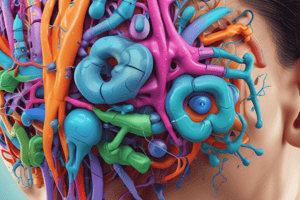Podcast
Questions and Answers
What is the maximum recommended daily dosage of ibuprofen for chronic headache management?
What is the maximum recommended daily dosage of ibuprofen for chronic headache management?
- 660mg per day
- 4g per day
- 5g per day
- 3,200mg per day (correct)
Which condition should contraindicate the use of ibuprofen?
Which condition should contraindicate the use of ibuprofen?
- Allergies
- Chronic migraines
- Gastrointestinal issues (correct)
- Mild headaches
What is a potential risk associated with using aspirin in children under 48 years old?
What is a potential risk associated with using aspirin in children under 48 years old?
- Heart failure
- Reye's syndrome (correct)
- Chronic fatigue syndrome
- Kidney stones
Which of the following is true regarding the recommended dosage of naproxen for chronic headaches?
Which of the following is true regarding the recommended dosage of naproxen for chronic headaches?
How frequently can chronic headache sufferers take ibuprofen?
How frequently can chronic headache sufferers take ibuprofen?
Flashcards
Chronic headache
Chronic headache
Headache that lasts for more than 15 days a month.
Max ibuprofen dosage
Max ibuprofen dosage
3,200 mg per day.
Reyes syndrome risk
Reyes syndrome risk
Avoid using ibuprofen in children under 48 years old, especially in the case of this syndrome.
Maximum naproxen dosage
Maximum naproxen dosage
Signup and view all the flashcards
GI Issues and medication
GI Issues and medication
Signup and view all the flashcards
Study Notes
Headache Management: Chapter 5
-
Patient Assessment: Assess patient, pain, medical history and prior treatments.
-
Self-Treatment Exclusions:
- Severe head pain
- Headaches with rapid onset of maximum pain
- Significant changes in headache pattern
- Headaches lasting 10+ days, whether treated or not
- Age < 8 years old
- High fever/signs of serious infection
- Neck stiffness (meningitis)
- Neurological changes (vision disturbances, seizure, altered mental status)
- High-risk comorbidities (cancer, HIV)
- Last trimester of pregnancy
- New headaches during pregnancy
- Headaches due to underlying medical condition (except for mild sinus headaches)
- Symptoms consistent with migraine without diagnosis
- History of liver disease or ≥3 alcoholic drinks daily
-
Medical Referral: Referral if exclusions for self-treatment apply, or if headache persists. -Analgesic use >3 days/week? -Yes: Medical referral - No: Consider appropriate nonpharmacologic & pharmacologic therapy or treatment for decreasing analgesic use over several days, then medical referral.
-
Drug Avoidance: -<12 years old: Avoid salicylates and avoid naproxen -<18 years old: Avoid salicylates
-
Analgesic Use: Use acetaminophen, an NSAID, or salicylate as appropriate if analgesia is adequate.
- Follow-up recommended after 4-6 weeks, based on frequency/severity of headaches
-
Analgesic Reduction (if needed): Decrease analgesic use over time, referral if persisting headache.
-
Migraine Assessment Patients diagnosed with Migraine or sinus or tension-type headaches proceed to appropriate therapy recommendations.
Analgesic Types
- Acetaminophen: For pain relief & fever
- NSAIDs: Ibuprofen, naproxen for pain relief (but consider age restrictions & drug interactions).
- Salicylates: Aspirin for pain relief (restrict use in children <18)
General Headaches
- Hyperthermia: Malfunctioning of thermoregulatory process.
- Hyperpyrexia: Body temperature above 106°F.
- Normal Temperature: 97.5-98.9°F
- Pyrogens: Fever-producing substances.
- Prostaglandins: Response to pathogens.
Chronic Headaches
-
Tension-Type Headaches: Most common, stress-related.
-
Migraines: More severe, trigeminovascular system dysfunction or episodic.
-
Sinus Headaches: Associated with sinus symptoms.
-
Non-pharmacological Therapy: For Chronic Tension-Type Headaches - Relaxation exercises, strengthening of head and neck muscles, acupuncture.
-
Important Considerations: Timing, frequency, and severity of headaches are crucial factors impacting treatment and management strategies.
Studying That Suits You
Use AI to generate personalized quizzes and flashcards to suit your learning preferences.




